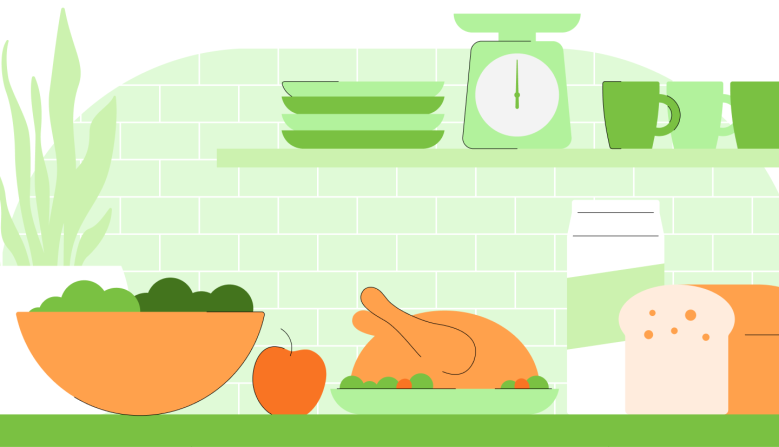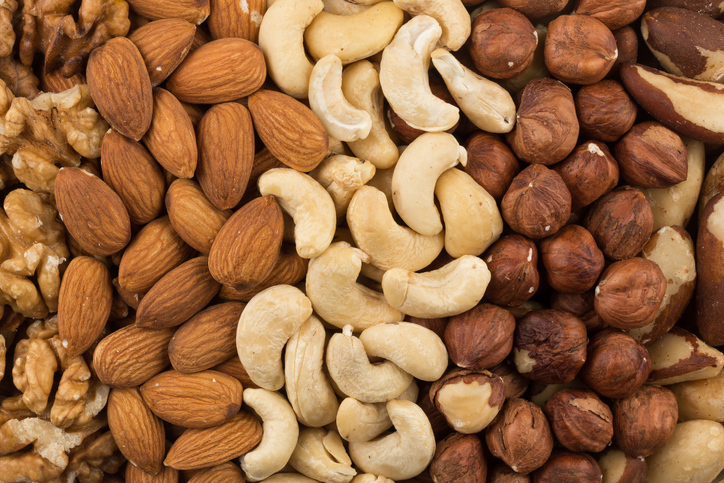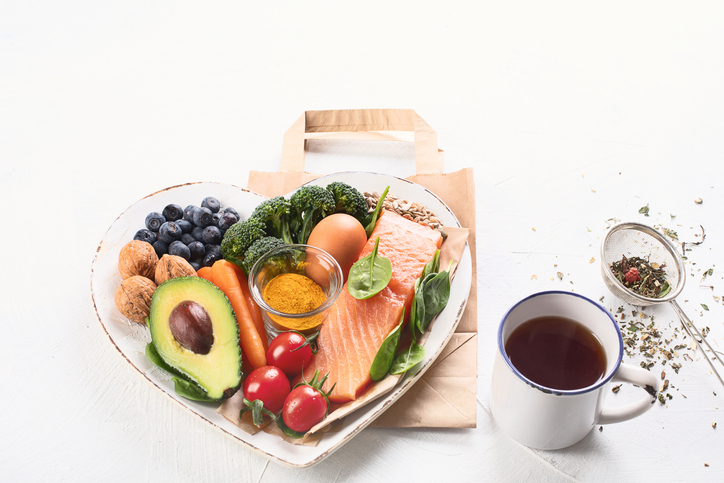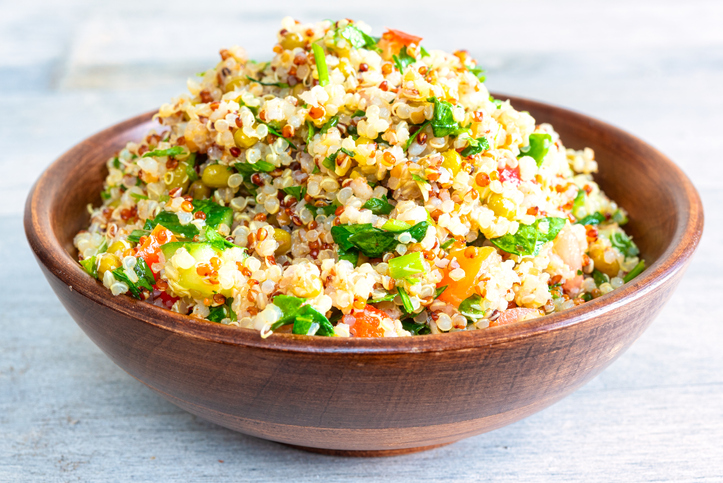Ketogenic Diet 101: A Beginner’s Guide
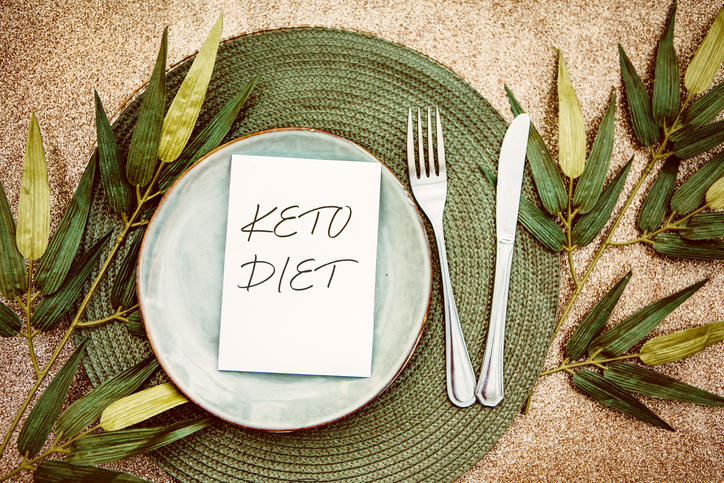


After years of being restricted to therapeutic nutrition in hospitals, the ketogenic diet (typically called the keto diet) is one of the hottest diet trends in America.
The diet originated back in the 1920s as a way to treat childhood epilepsy, and due to its striking success rate—people eating a keto diet experience about 30% to 40% fewer seizures—it’s still used in that field today.
But what about its use for the general healthy population just looking to drop a notch on their belt or get more out of life? Let’s unpack this ultra-low carb, high-fat diet bit by bit.
What is the keto diet?
The ketogenic diet is super high in fat (about 80% of your daily calories), super low in carbohydrates (less than 5% of your calories), and moderate in protein (typically 15% to 20% of your calories). This is a pretty drastic departure from the generally recommended macronutrient distribution of 20% to 35% protein, 45% to 65% carbohydrates and 10% to 35% fat.
The most important component of the keto diet is a natural and normal process called ketosis. Normally, bodies run very well on glucose. Glucose is produced when the body breaks down carbohydrates. It’s a very simple process, which is why it’s the body’s preferred way to produce energy.
When you cut back on carbs or just haven’t eaten in a while, your body looks for other sources of energy to fill the void. Fat is typically that source. When your blood sugar drops because you’re not feeding your body carbs, fat is released from your cells and floods the liver. The liver turns the fat into ketone bodies, which your body uses as its second choice for energy.
What foods can you eat on the keto diet?
A typical keto diet consists largely of:
- Meat
- Fish
- Butter
- Eggs
- Cheese
- Heavy cream
- Oils
- Nuts
- Avocados
- Seeds
- Low-carb green vegetables
This short list leaves out all of your favorite carb-heavy foods, such as grains, rice, beans, potatoes, sweets, milk, cereals, fruits and even some vegetables.
What are the potential benefits of the keto diet?
While the keto diet certainly is not easy, research shows it has some potential therapeutic benefits, in addition to its use for treating epilepsy. Here are some areas of research where a keto diet shows promise.
Alzheimer’s disease
Research suggests that when patients with Alzheimer’s eat a ketogenic diet, cognitive function significantly improves. It’ss believed that this has something to do with improving mitochondrial function by providing the brain with new fuel.
Parkinson’s disease
One of the key features of Parkinson’s disease is the abnormal accumulation of a protein known as alpha-synuclein. Research funded by the Michael J. Fox Foundation for Parkinson’s Research has explored whether a ketogenic diet stimulates the breakdown of these proteins, reducing the amount of alpha-synuclein in the brain.
Multiple sclerosis
In a small 2016 study, patients with multiple sclerosis were put on a ketogenic diet. After six months, they reported improved quality of life, as well as physical and mental health improvements. Before doctors or researchers can make a connection between keto and MS, they need bigger sample sizes and more thorough research. Still, the preliminary findings are exciting.
Cardiovascular disease
This is definitely a point of confusion and controversy since a diet that relies so heavily on meat and fat is naturally thought to raise blood cholesterol and cause heart issues. However, some evidence suggests that this may not be the case. In fact, the keto diet may help improve triglyceride, HDL and LDL levels. A 2017 review looked at all of the available evidence around the ketogenic diet and cardiovascular health and found that the diet may be associated with some improvements in cardiovascular risk factors. Mind you, the authors also expressed their concerns with maintaining the diet in the long term, and they proposed that these benefits may not be long-lasting. It’s clear that we need long-term studies to fill that gap.
Type 2 diabetes
This population has been studied heavily with the keto diet, since it’s technically as low-carb as you can get. While the research to date has been conducted in very small sample sizes, evidence suggests that an ultra-low-carb diet (like the keto diet) may help reduce A1C and improve insulin sensitivity by as much as 75%. In fact, a 2017 review found that a keto diet was associated with better glucose control and a reduction in medication use. Having said that, the authors cautioned that it was unclear whether the results were due to weight loss in general, or higher ketone levels.
Cancer
Early experimental research suggests that the keto diet may have anti-tumor effects, likely because it reduces overall calorie intake (and circulating glucose) for tumor growth. In one 2014 review of animal research, a ketogenic diet was found to be successful at reducing tumor growth, colon cancer, gastric cancer and brain cancer. More research on humans with larger sample sizes is needed, but it’s definitely food for thought.
Can the keto diet help with weight loss?
This is one of the keto diet’s main selling points and a primary reason it’s so popular: keto diet proponents say you can drop a lot of weight in a relatively short period of time. But is that too good to be true?
A number of studies, including one meta-analysis, have found that patients assigned to a very-low-carbohydrate diet (like the keto diet) had greater weight-loss outcomes compared with those eating low-fat. Promising, right? Well, weight loss is only good if that momentum is sustainable long-term, and it’s not clear that that’s the case.
A large meta-analysis found that while low-carb dieters tended to lose more weight than low-fat dieters at first, the differences disappeared by the one-year mark. It seems that there may be an early difference, but it might all wash out the same in the end.
Still, let’s look at some reasons why keto may work for some people as a weight-loss tool.
- Calorie restriction: When you severely restrict your food intake by cutting out many categories of food, you’re quite likely to lose weight.
- Water loss: There is some evidence that higher-protein diets like the keto diet do have some weight-loss benefits, partially because both fat and protein are satiating, so you don’t feel hungry, but also because of the loss in glycogen stores. Glycogen is the body’s glucose storage that is bound up with water, so when we deplete the glycogen, you also deplete your water storage. Lose a ton of water, and you’re going to drop weight fast.
- Appetite control: In addition to the satiating capabilities of fat and protein, research suggests that the keto diet may help suppress the hunger hormone, ghrelin. For people who are always hangry, this is a really big plus.
The downsides of keto
Unfortunately, it can’t all be rainbows and unicorns. Here are some potential side effects and dangers of eating keto.
Athletic performance impediments
For those people who train heavy and hard, going keto might cramp your style. As important as protein is for muscle growth, carbs also play an equally critical role by releasing insulin to drive that protein into muscles faster. It also helps us build up glycogen stores for longer training sessions, runs or hikes. One comprehensive review of the literature in sports nutrition found that while research is lacking on the long-term impacts of the keto diet, in the short term, the keto diet is inferior to other diet protocols on anaerobic, aerobic and in some cases even strength performance measures.
Keto “flu”
Your body isn’t accustomed to using ketones on the regular, so when you make the switch, you tend to feel unwell. The keto diet also influences electrolyte balance, resulting in brain fog, headaches, nausea and fatigue. Keto dieters also consistently complain about getting bad-smelling breath, sweat and pee as a result of the by-product of fat metabolism (acetone) seeping out. Thankfully, this effect is just temporary, so just know you won’t have to spend your life smelling rank.
Constipation
No one likes to feel backed up and, sadly, if you’re not careful about your diet choices when going keto, it could become a regular concern. One 10-year (albeit small) study looking at the effects of a keto diet on young children found that 65% experienced digestive woes. Thankfully, going keto is not a life sentence for problem bowels. Since you’re cutting out whole grains and fruit (two of the most common sources of fiber), aim to up your fiber-rich veggies, and consider a fiber supplement.
Nutrition deficiencies
As with any super-restrictive regimen, when you cut food out, there’s a good chance you’ll be missing something big. Here’s what you need to keep an eye open for:
- Sodium. Believe it or not, depending on your diet, you may be low on salt. When carb intake is low and insulin isn’t being excreted, the kidneys absorb less sodium and potassium and excrete more as waste, leaving you feeling dizzy, fatigued and grumpy. Rather than reaching for more processed food, try seasoning your food a little more liberally with sea salt.
- Potassium. With the approved list of foods being so brief, you might not be getting in enough fruits and veggies on keto. One of the biggest impacts? A potassium deficiency—and all of the lovely constipation and muscle cramps that accompany it. Aim to up your intake of foods like spinach, avocado, tomatoes, kale and mushrooms to get your potassium fix.
- Vitamin C. Most of our vitamin C intake comes from a nice array of fruits, so if you’re cutting all of that out, you’ll have to make sure you’re keeping your veggies up to compensate. Reach for more broccoli, Brussels sprouts, cauliflower and cabbage to ensure you get your fill.
Disordered eating
As with all restrictive eating patterns, the keto diet certainly can interfere with your relationship with food. Overly restricting or removing whole food groups from your diet has the very real power to encourage orthorexic tendencies and an unhealthy obsession with what to eat.
It also interferes with some of the social aspects of food, considering how limiting it is. No cake on your birthday. No pie on Thanksgiving. No chocolate truffles on Valentine’s Day. Boo to that! If you consider yourself someone who loves to eat and takes great joy in the social experience of a good meal, then the restriction of this diet may be emotionally unhealthy.
Who shouldn’t do the keto diet?
Before starting any new diet, you should always clear it with your health care provider first. This is particularly true for certain groups for whom the keto diet may not be a healthy idea. These include (but are not limited to):
- People with gallbladder or pancreatic issues: Fat is more difficult than other macronutrients for the body to digest, so this may be a strain for those with gallbladder or pancreatic disease.
- Pregnant and breastfeeding women: While research is in its infancy, early animal models suggest some metabolic changes occur during ketosis that may impact fetal growth. This time of your life is also not the time to risk undernourishing yourself, as nutritional deficiencies and extreme weight loss may reduce milk supply and stunt infant growth.
- Healthy children: Childhood is never a time for dieting, never mind an extreme diet like the ketogenic diet.
- People with kidney issues: Those who are prone to kidney stones may want to avoid the keto diet due to the shifts in sodium, potassium and fluid balance.
- People with a disordered eating history: As previously mentioned, the keto diet is extreme, and any type of diet that severely restricts or limits foods may perpetuate disordered eating thoughts.
- Bariatric or gastrointestinal surgery patients: Patients with limited digestive capacities should avoid the keto diet, since fat is particularly difficult for the body to digest.
The bottom line on keto
From the early understanding of the keto research and literature, it looks like we’re just scratching the surface of understanding some of the potential therapeutic roles of the keto diet. While it’s unclear if it’s any better or worse than any other diet for weight loss, the reality is that there is no one-size-fits-all model for diets. This doesn’t even consider that weight-loss diets, in general, don’t really work. While researchers can’t agree on a specific statistic, it’s commonly accepted that the vast majority of dieters will regain the weight lost (and often pack on extra pounds, as well). The long-term outcome of the keto diet is likely to be no different, especially given how challenging and restrictive it is to maintain.
Our advice? If you like carbs, don’t swear them off entirely. Choose healthy carbohydrates more often and choose the most satiating versions of them to fuel you. And if you want to give keto a try, get in touch with a registered dietitian to help you work through the diet correctly and in a healthy manner.
© Meredith Operations Corporation. All rights reserved. Used with permission.














